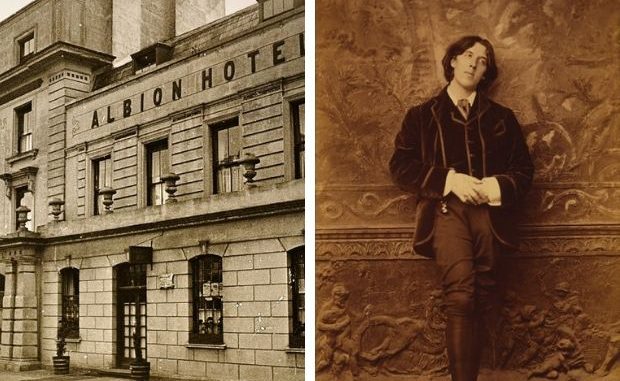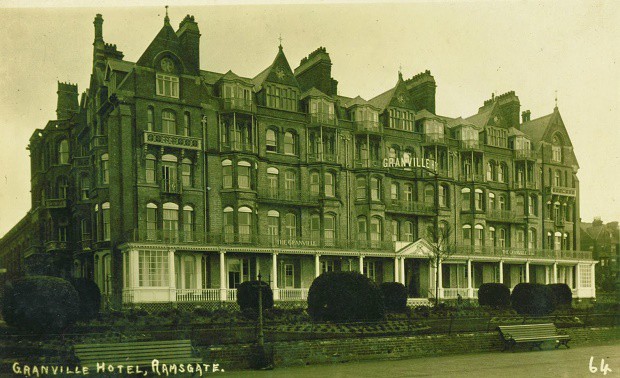
‘I am glad you went to Margate, which I believe, is the nom-de-plume of Ramsgate. It is a quite nice spot not vulgarised by crowds of literary people. I hope it has done you and your companions good,’ so wrote Oscar Wilde on March 7, 1898.
Writing from exile in Paris, Wilde’s letter was to Leonard Smithers, a Sheffield solicitor turned bookseller and publisher. Smithers, who had a reputation of publishing work mainstream publishers wouldn’t touch, had just purchased The Ballad of Reading Gaol.
By this time in his life, Oscar was very much persona-non-grata with wider society as a result of his conviction at the Old Bailey, three years earlier, for sodomy. The opening of his letter suggests a familiarity with Ramsgate but not Margate, which would be correct.
Wilde made two visits to Thanet during the 1880s, the first being during the summer of 1883 when the following advertisement appeared in the Thanet Advertiser: ‘Mr Oscar Wilde has the honour to announce that he will deliver a lecture, entitled “Personal Impressions of America” at the Granville Hall, Ramsgate, at eight o’clock on the evening of Thursday July 26…’ Ticket prices ranged from one to three shillings and could be purchased at select locations in the town, including the Granville itself, where a plan of the hall was on display.

Although well known for his appearance, manner of speaking and attitudes on art and beauty, Oscar, at this juncture in his life, had not yet written any of the work for which he is now famous. At the time he was courting Constance Lloyd, who he would later marry. His sexual relationships with younger men, starting with Robert Ross, were still to come, and although aware of his attraction towards the beauties of youth, Oscar was also very conscious of the dangers of being openly homosexual; the government at the time was planning a tougher stance on what it saw as a vile and unnatural act. But for now, Oscar was the darling of polite society.
At the Granville, before a ‘fair and very select audience’, ‘Impressions of America’ was an ensemble of observations on the country’s scenery, people, art and theatre, delivered with trademark Wildean wit. If those attending were expecting to see Oscar dressed in a flamboyant outfit complete with green carnation then they were disappointed. Writing two days later, the Thanet Advertiser saw ‘nothing particular’ in the attire of Mr Wilde that ‘distinguished him from other young men of the day’. The lecture itself, however, was delivered with ‘a good deal of quaint humour and originality’.
How long Oscar stayed in Ramsgate is unclear but with the town’s proximity to London, thanks to the railways, it’s unlikely he stayed any longer than one night. By the time he returned to Thanet, five years later, Oscar was married with two young sons, working as editor for Woman’s World magazine and had published one of his most endearing short stories, The Happy Prince.
A visit to Broadstairs
On September 3, 1888, while London was reeling from the shocking murders in Whitechapel, Oscar spent one night at Broadstairs Albion Hotel. Alongside his signature are those of P. Hardy and L.H. Carr, and they are the only signatures for the entire day.
By now Wilde had met Robert Ross and was sexually active, cruising the gay haunts of London, where you could pick up a ‘renter’ (a young man supplementing his meagre wage with sex) with relative ease. Once having acquired his bit of ‘trade’, Oscar would wine and dine them at a hotel, before retiring upstairs. It was risky though, as renters weren’t above blackmailing their lovers.
So was this why Oscar was at the Broadstairs Albion Hotel? Had he travelled down from London for a bit of nookie by the sea? There’s nothing to suggest that either Carr or Hardy had any connection with Wilde, beyond being guests at the same hotel. But neither is there any evidence that proves one or both weren’t there at Oscar’s behest. Whatever the truth, this was Wilde’s last visit to the area.
Interestingly, Thanet does have one other Wildean connection.
On October 23, 1915, the Thanet Advertiser reported the sudden death of Henry Coope, who lived in the hamlet of Chilton, near Pegwell Bay. Before his retirement, sometime after 1911, Coope (64) had served for over thirty years as warder at Wandsworth Gaol. During the summer of 1895, the prison received a new inmate from Pentonville — Oscar Wilde.
Henry, though, had little time to get to know Oscar, as in September of that year, the playwright was transferred again, this time to Reading.

